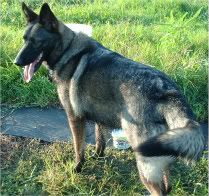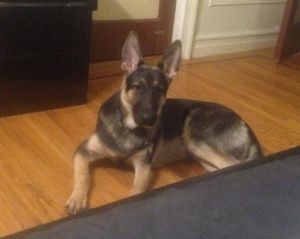 Re: How to know when a dog knows a command
[Re: Natalie Rynda ]
#383915 - 10/09/2013 02:09 PM Re: How to know when a dog knows a command
[Re: Natalie Rynda ]
#383915 - 10/09/2013 02:09 PM |
Webboard User

  
Reg: 09-23-2011
Posts: 2692
Loc: Marrero, LA
 Offline Offline |
|
|
 Top Top
|
 Re: How to know when a dog knows a command
[Re: ian bunbury ]
#383916 - 10/09/2013 02:09 PM Re: How to know when a dog knows a command
[Re: ian bunbury ]
#383916 - 10/09/2013 02:09 PM |
Webboard User

Reg: 10-01-2013
Posts: 343
Loc: nyc
 Offline Offline |
|
natalie , duane said something back on page three that i'm not sure you picked up on , or if you did , may not have realized the importance of . . .
" engagement "
that's where all your focus should be .
if you and the dog don't share that , then don't even bother trying for " obedience " performance . sure you can get the dog to do things , as it appears you are trying with varying degrees of success , but if the dog is not motivated to be working with you , it is always going to be " work ".
if the dog is engaged , then it wants what you have , and wants to be doing what you are doing . obedience becomes easy , and fun , for you and the dog .
i'd suggest going back to those DVD's and watching them ad nauseam until you fully understand everything that ME is presenting . i mean like really understanding to the point that you know the answers to the principles and concepts before he says them . when you have that down , then you can start answering the questions you have for yourself .
there is a lot of experience here on the board , but in the end , you are the one responsible for actually putting all the info into practice .
I picked up on it and didn't comment on it because this part I already know and I THINK I have engagement though every day we are outside my goal is to have him interested in me and not everything around.
I do understand the importance of it, ME explained it very well, you can't teach someone who's not paying attention.
Anyway, most of our training is done outside, I know that's not the best way of doing it but that's the routine for now.
So I spend most of the 2 hours trying to make sure I can get him to ignore surroundings and focus on me.
At home I already have his undivided attention.
Outside it doesn't always work but thats a goal I'm working towards.
Lol, I watched the power of food twice and didn't watch it a third time because I knew what he was about to say.
So I guess I'm still missing something. It's been a month, I will watch it again this weekend.
|
 Top Top
|
 Re: How to know when a dog knows a command
[Re: Duane Hull ]
#383917 - 10/09/2013 02:12 PM Re: How to know when a dog knows a command
[Re: Duane Hull ]
#383917 - 10/09/2013 02:12 PM |
Webboard User

Reg: 10-01-2013
Posts: 343
Loc: nyc
 Offline Offline |
|
I did, twice, but again, a month ago. Time to rewatch with everything I learned in the month and all the problems I've been having.
|
 Top Top
|
 Re: How to know when a dog knows a command
[Re: ian bunbury ]
#383919 - 10/09/2013 02:16 PM Re: How to know when a dog knows a command
[Re: ian bunbury ]
#383919 - 10/09/2013 02:16 PM |
Webboard User

Reg: 10-01-2013
Posts: 343
Loc: nyc
 Offline Offline |
|
and i want to pass on a little piece of advice that michael gives to his students :
" there are no bad lion trainers "
what he means by that is , you can make a lot of mistakes training your dog , and things will still probably work out ok . lions , on the other hand . . .
i understand your need to want to know as much as you can before proceeding , i'm the same way ( with some things ) , but at some point you gotta get 'r done . don't be afraid to make some mistakes . as long as you are making progress towards the dog you want in the future , it's all good .
If you say so 
From what people are saying I'm doing many things I shouldn't be doing.
I'm afraid I'm confusing the hell out of him. The last 6 months I've been doing things every day and switching techniques very often.
He must be soo confused. That's why a month ago I decided to stick to one system and got the DVDs.
I thought I was doing OK, I'm seeing some progress. Obviously not from reading here.
|
 Top Top
|
 Re: How to know when a dog knows a command
[Re: steve strom ]
#383921 - 10/09/2013 02:21 PM Re: How to know when a dog knows a command
[Re: steve strom ]
#383921 - 10/09/2013 02:21 PM |
Webboard User

Reg: 10-01-2013
Posts: 343
Loc: nyc
 Offline Offline |
|
Steve, it turned out I'm not even close to the corrections part, I was misunderstanding the stage the corrections come in at.
However, I like your idea of training LEAVE IT and COME as a sequence. I will do that when he learns them separate.
Also, I don't think I like the idea of him only listening after I cue him in. I understand why you'd do that, I also struggle with the sniffing and how to tell him when it's OK and when it's not but I also like for any command to be listened to, whether it's down time or not.
I haven't been doing the READY and DONE for the training sessions. Is that a big deal?
Considering that I want him listening to me always, should I mark the beginning and the end of the training session?
What I'm talking about isn't a stage to add corrections, I'm talking about conditioning him so that he understands corrections. It may not seem like it, but it really is different.
He's not going to only listen to you when you cue him. It carries over. You can't teach obedience by accident. The commands have to be clear to him and unless you want to crank on him all the time, the way to teach those commands is with his attention on you. If he's not paying attention to you, you'll become the distraction and doing nothing but nagging him. When the command means something to him, he'll be willing to comply even without the cue. See what I mean?
To me, the ready and done are a big deal. I always mark the beginning and end of training.
Lol got you, I will start marking the beginning and the end. I didn't realize that's how it works.
I'd love to understand how he thinks and what he understands from everything I'm teaching him.
Things would be so much easier. Something is not clicking for me. I'm sure it will at some point.
|
 Top Top
|
 Re: How to know when a dog knows a command
[Re: Duane Hull ]
#383922 - 10/09/2013 02:26 PM Re: How to know when a dog knows a command
[Re: Duane Hull ]
#383922 - 10/09/2013 02:26 PM |
Webboard User

Reg: 10-01-2013
Posts: 343
Loc: nyc
 Offline Offline |
|
Also, another question. Since commands are trained a few at a time there will come a time when some command is already proofed and other aren't.
So do I correct for those commands or do I wait until every single command is proofed?
Absolutely. You will always be in different stages of training multiple commands, but as Steve said, try one at atime until y'all get good at it. One thing that I've seen several new trainers get intimidated by is that they see us train several things at a time at the club, not realizing that each has been trained individually and some are farther along than others.
Where I'm getting at is at some point i'd like to be able to call my dog off something and not have to reward if I don't have the treats.
You will eventually phase the food out of all your behaviors. My dog does not get rewarded for everyday behaviors, and the food has to be trained out of her schutzhund disciplines.
So that means it will go something like this
1. Teach a command
2. Proof it
3. Correct for non compliance
Next command
Repeat
Right?
Again, I'm not stuck on correcting, I actually don't like to correct and probably can't correct hard enough.
I'm only asking because I want to understand where corrections come in so that I don't mess him up by using them in the wrong stage.
I'm about to post about the problems I'm having and how I'm correcting him for it.
I'd love a different way.
|
 Top Top
|
 Re: How to know when a dog knows a command
[Re: Natalie Rynda ]
#383925 - 10/09/2013 02:48 PM Re: How to know when a dog knows a command
[Re: Natalie Rynda ]
#383925 - 10/09/2013 02:48 PM |
Moderator

   
Reg: 07-13-2005
Posts: 31580
Loc: North-Central coast of California
 Offline Offline |
|
Good catch, Wendy.
Stop correcting by popping him with a prong.
This may not need saying, since it's probably clear that you are not at the correcting stage anyway.
"If you're saying it's not a big deal that I thought proofing means corrections and it's OK that I've been popping his prong at least once every day for the past 3 months then I will go on experimenting. "
I'm not. I'm saying that it's time to use your new knowledge.
Train. Start with zero distraction. For me, that's indoors.
Proof.
Put corrections on the back burner.
Confusing training mixed with unfair corrections is not a good thing.
Marker training and proofing ... this is not going to damage your bond.
|
 Top Top
|
 Re: How to know when a dog knows a command
[Re: Natalie Rynda ]
#383928 - 10/09/2013 02:46 PM Re: How to know when a dog knows a command
[Re: Natalie Rynda ]
#383928 - 10/09/2013 02:46 PM |
Moderator

   
Reg: 07-13-2005
Posts: 31580
Loc: North-Central coast of California
 Offline Offline |
|
"I'm only asking because I want to understand where corrections come in so that I don't mess him up by using them in the wrong stage. "
When it comes up, post and ask. 
Train and proof. Play with the dog. Forge a great bond with him. From this, everything good will naturally come.
|
 Top Top
|
 Re: How to know when a dog knows a command
[Re: Wendy Lefebvre ]
#383929 - 10/09/2013 02:46 PM Re: How to know when a dog knows a command
[Re: Wendy Lefebvre ]
#383929 - 10/09/2013 02:46 PM |
Webboard User

Reg: 10-01-2013
Posts: 343
Loc: nyc
 Offline Offline |
|
My pup is 9 months old. I'm way behind in his training and I've obviously done things the wrong way.
Just wanted to say, you are NEVER behind in training. Alot of us on here have rescue dogs that we obtained when they were 1-2 years of age or older. It really doesn't matter what age you start to use marker training, so don't try to rush...slow and steady is the best way to get to a satisfying end result.
If i were you, i would concentrate on one issue for now. You are thinking way way too far ahead and it's better to deal with the present then it is to start worrying about what happens in the future.
i know that i can start at any time, the reason i'm saying that is because he's getting large and strong, we have to walk the streets with him and i can't control him when something happens.
i'm not worrying about what happens in the future, i'm trying to understand how the system works. before i started this thread i thought i was already at the corrections stage.
You're using a prong for corrections??? Someone else jump in here, but I don't believe you should have the dog on a prong collar at this stage.
at this point i can't control him outside without the prong. he pulls way too hard for me. i'm doing the leash pressure training but we are far away from him not pulling.
also, inside the house, he will attack my cats (one he almost attacks, the other one he wants to play with, both are bothered by it and it must be stopped). screaming NOOOO doesn't work, taking him away doesn't work, i just got a crate a week ago (stupid, i know, i'm loving the crate, i wish i listened earlier) but he already spends 20 hours in it, i want to give him some loose time.
so what do i do when he bothers them? i can separate them in different rooms and leash him to me always, but how will he ever get along with them?
also, he lunges at dogs, some people and some kids. i've been working on this with the help of a trainer, i go stand on a corner, wait until i see him zoomed in on someone and give him treats. i try to get his focus before i give him the treats but if he's too focused on the target (whatever it is) then i just give him the treat, my goal is not have him bark at all.
so it's MUCH better, he stopped reacting to people (2 weeks already but i'm still on the watch) but still reacts to dogs. the trainer said he reacts to dogs out of excitement, he wants to get to them and play.
she might be right because it i let him go to the dog he will play, he won't attack but his barking and posture doesn't look friendly (to my unexperienced eye), his hackles go up sometimes too.
so sometimes i don't see the other dog in time and he gets in the barking zone and phases me out. i have to pop him, not much else i can do (if we are walking on the street i don't pop, i make a uturn and walk away, but when we are at the park he's tethered to a tree on a 30 ft line and we can't walk away anywhere, i can't make him turn around either, he overpowers me and looks at the dog so i pop him and he stops).
|
 Top Top
|
 Re: How to know when a dog knows a command
[Re: Natalie Rynda ]
#383930 - 10/09/2013 02:56 PM Re: How to know when a dog knows a command
[Re: Natalie Rynda ]
#383930 - 10/09/2013 02:56 PM |
Moderator

   
Reg: 07-13-2005
Posts: 31580
Loc: North-Central coast of California
 Offline Offline |
|
Almost all of this post it is about desensitizing (and there are volumes written on the board about it); this thread's answers have been about knowing basic ob commands.
The answers in the thread so far don't all apply to the cat problems or the reactivity.
Are your parents involved in this dog's training? (Was I wrong in assuming that you're a teenager?)
|
 Top Top
|
When purchasing any product from Leerburg Enterprises, Inc. it is understood
that any and all products sold by Leerburg Enterprises, Inc. are sold in Dunn
County Wisconsin, USA. Any and all legal action taken against Leerburg Enterprises,
Inc. concerning the purchase or use of these products must take place in Dunn
County, Wisconsin. If customers do not agree with this policy they should not
purchase Leerburg Ent. Inc. products.
Dog Training is never without risk of injury. Do not use any of the products
sold by Leerburg Enterprises, Inc. without consulting a local professional.
The training methods shown in the Leerburg Ent. Inc. DVD’s are meant
to be used with a local instructor or trainer. Leerburg Enterprises, Inc. cannot
be held responsible for accidents or injuries to humans and/or animals.
Copyright 2010 Leerburg® Enterprises, Inc. All rights reserved. All photos and content on leerburg.com are part of a registered copyright owned by Leerburg Enterprise, Inc.
By accessing any information within Leerburg.com, you agree to abide by the
Leerburg.com Privacy Policy and Terms of Use.
 Previous Topic
Previous Topic Index
Index Next Topic
Next Topic













 Top
Top




.jpg)
